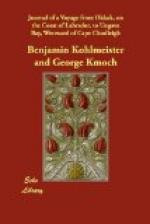We were attended on the voyage by a skin-boat (or woman’s boat) in which were Thukkekina and his wife, and their adopted child Mammak, a boy twelve years old. Their age is about forty. The skin-boat was intended as a refuge, in case of any accident happening to our own boat, and was useful in landing, as we never brought the large boat close in shore. The first four families belong to Hopedale, Thukkekina and his wife to Okkak. They considered it as a great favour conferred on them to be permitted to accompany us. Jonas and his family occupied the after-part, and the rest the fore-part of the boat. The wind was moderate, and due west. We lost sight of our habitations in about half an hour, behind the N.E. point of the island Okkak, called Sungolik.
At three, passed Cape Uivak, a cape on the continent, forming a moderately high headland, and the nearest place to Okkak, where Esquimaux spend the winter. Two or three winter-houses were standing.
The wind failing, we cast off the skin-boat, which rowed merrily a-head. Before us, between the islands to the east and the continent, we saw much drift-ice, and it required attention to avoid the large shoals, the wind coming round to the N.W. We cast anchor at NUNGOROME, a cove about ten English miles from Okkak, where we found several of our Esquimaux, who had here their summer-station. Several had come from Naujasiorvik and other places, on purpose to meet us, and once more to express their affection and best wishes for our safe voyage and return. Late in the evening, we met on a green spot, where Brother Kohlmeister delivered a short discourse and prayer, after which we retired to sleep on board the boat.
CHAPTER II.
Departure from Nungorome Cove.
Account of Solomon. Drift-ice.
Cape Mugford. Waterfalls from the
Kaumayok Mountains. Fruitless
attempt to get out of the Ikkerasak, or
Straits.
Nungorome is a cove on the south side of the Island Pacharvik. Between this island the main land is a narrow strait, so shallow that no whales can pass. The Esquimaux stretch their nets across, to catch seals, seeking shelter in it when the wind sets in from the open sea. They can only be taken in the night, and the greater part of those which frequent this coast are of the Kairolik kind, a middle-sized animal, and of the Ugsuk, the largest species of the seal tribe, weighing sometimes from five to six cwt.
The Esquimaux belonging to our congregation, who were at present stationed here, in tents, were Moses, Samuel, Thomas, Isaac, Bammiuk, and their families. Solomon, who has left our communion, was also here. He had formerly been a communicant member of Okkak congregation, but could not resist the temptation of going to the north to feast with the heathen Esquimaux, whenever they had




